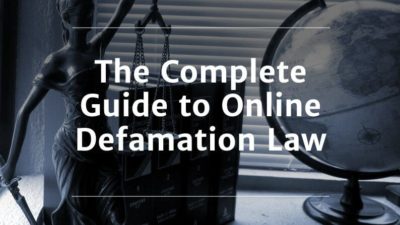
How Can I Remove False & Defamatory Restaurant Reviews From OpenTable?
This page has been peer-reviewed, fact-checked, and edited by qualified attorneys to ensure substantive accuracy and coverage.
1. The Facts: What is OpenTable?
Founded in 1998, after owner Chuck Templeton struggled with finding a suitable restaurant for his wife and him to book a dinner reservation, OpenTable has become the premier online destination for foodies wanting to leave restaurant reviews and share opinions and pictures.
As of 2017, OpenTable covers about 43,000 restaurants, and reserves and seats more than 23 million diners per month, across most U.S. states and cities, along with several international cities, including; London, Berlin, Tokyo, Melbourne, and more. In total, OpenTable has seated over 1.4 billion diners across the globe, generating more than $56 billion dollars spent at partnered restaurants.
OpenTable’s online reservation platform includes reviews and information ranging from food trucks, to family-friendly restaurants and five-star white-glove service establishments. Most notably, the appeal of the site extends far beyond the classic “foodie,” and is catered and tailored to members of the general public who are simply trying to narrow down a nice first-date or anniversary restaurant for dinner and drinks.
Defamation Law Fact: On February 14th, 2015, OpenTable seated more than two million diners across the world, with 45% of all reservations being made in the week preceding, and 10% on the day of. Why so many? Because it was Valentine’s Day.
Unfortunately, with global appeal and universal access, comes a small portion of reviewers and users attempting to harm and exploit OpenTable’s online platform in order to serve their own agendas. For example, OpenTable diners can receive anywhere between 100 and 1000 rewards points just for dining at a restaurant, which can later be redeemed for discounts or perks at other OpenTable restaurants. Also, rival business owners or malicious users often attempt to sabotage other businesses, in order to boost their popularity and customer base.
If you are a business owner, you know the harm and destruction that can be caused by just a single poor or false review. Business can drop, profits decline, and ultimately, you are left no choice but to close your doors. Therefore, it is in your best interest to takedown and stay vigilant for false and defamatory reviews posted about your business online. Negative and false reviews are not an option, and should not go unaddressed.
Defamation Law Fact: While OpenTable has a diner seating and confirmation security check in place to curb false and defamatory reviews, Yelp does not, opening them up to a higher likelihood of user abuse and libelous postings.
Let us help you explore your legal options and craft an effective strategy.Fake reviews harming your business?
2. What Are My Options For Removal?
Removing false and defamatory reviews is the best way to keep your business thriving and your customers and potential customers happy and interested. However, removing fake reviews isn’t always as easy as it seems, and often entails a complex and drawn out process.
If you encounter any malicious or harmful reviews that have been unjustly posted on OpenTable.com, reach out to the internet defamation attorneys at Minc Law. Our team will fight for the removal of all defamatory posts, and help secure the reputation of your business. He is confident in his ability to remove all defamatory content, and will refund your fee if unable to secure a removal.
To schedule a free and confidential consultation with an intake specialist, call us at (216) 373-7706 , or schedule a meeting online by filling out our online contact form.
Defamation Law Fact: Understand, there is a substantial difference between defamation and a negative review. OpenTable will publish all reviews that meet their community standards, meaning, even negative reviews about your company may be protected, granted they are truthful.
OpenTable Screening Measures
On their website, OpenTable assures users and restaurants that “rogue diners” are not able to manipulate the review platform by publishing multiple or inappropriate reviews. After dining at a restaurant, OpenTable sends dining feedback forms to patrons, who are confirmed “seated” by the restaurant.
Each booking allows for one feedback form, as to minimize the chances of multiple false reviews. On top of that, OpenTable claims to have various other security checks and filters in their arsenal, but refuses to publish and disclose details of them, in order to avoid assisting malicious patrons and reviewers in skirting the system.
How to Spot a Fake Review
Acquainting yourself with the characteristics and language of a false and defamatory review will put you a step ahead of the rest in protecting your business’s online reputation. Be sure to look out for the following:
- Excessive praise: Not every review that is a positive one is false. The average reviewer who leaves a positive review is not often piling on the adjectives and praise, so when you encounter a review that takes an almost eerily positive tone, take note of it.
- Check the dates: If there is a sudden barrage of reviews about your restaurant, and your restaurant has been relatively empty for the last few weeks, there’s a higher likelihood you’re dealing with fake reviews.
- Language: False reviewers aren’t usually native English speakers, so be mindful of the language used in the review. Some malicious restaurants may not have the time themselves to post defamatory and false comments, and outsource the job to a foreign firm.
- Lack of posting history: If the reviewer posting has never left a review before, this should raise red-flags. Why now did this reviewer decide to leave a negative and malicious review?
- Check their avatar: Many fake profiles have lifted and used pictures from other people’s social media profiles in order to seem like a real person. Use a reverse image search on Google to find the original source of the photo.
3. What Kind of Restaurant Reviews Will OpenTable Remove?

OpenTable can be a volatile platform for businesses, especially after they have been attacked and libeled unfairly by anonymous reviewers. First and foremost, OpenTable’s site policies allow for users and reviewers to remain anonymous, only revealing their identity if they choose to identify themselves.
Anonymity and user reviews are a bad mix, granting users a sense of invincibility behind an unverified or regulated platform. Because of this, it is fairly common for anonymous reviewers to attack businesses and restaurants online, as legal recourse is few and far between.
No business should have to close or suffer due to the malicious and false postings of an anonymous user who hasn’t even visited the restaurant.
If it sounds like there isn’t hope for removing false reviews, don’t fear. OpenTable’s privacy and removal policies allow for removal of reviews under specific circumstances. The largest hurdle to removing a defamatory posting is proving that the review and content in question, meets the prescribed for criteria for removal. Working with an experienced Internet defamation removal attorney is an effective and efficient way to locate, gather, and submit evidence needed to remove a review.
Defamation Law Fact: Since 2008, OpenTable has had more than 58 million reviews written by verified diners, ultimately averaging about 1.3 million reviews per month.
In order to maximize your chances of success when removing a defamatory review, you should acquaint yourself with the following content outlined by OpenTable as unacceptable.
- Helpfulness: At its most basic, every OpenTable review should be helpful. OpenTable’s community standards for ratings and reviews states, “the best reviews include not only how you felt about the restaurant but also why.”
- Authenticity: OpenTable reviews are required to be “authentic,” meaning, the user should have actually visited and eaten at the establishment. Sometimes, it’s as simple as a reviewer making a mistake and reviewing the wrong restaurant. However, sometimes it is much more malicious than that. OpenTable has experienced countless situations where reviewers are engaged in a negative advertising campaign against a particular establishment in order to boost business and traffic to their own competing business.
- Blackmail: When given a certain degree of power, it isn’t uncommon for some to take the less righteous path and expect special treatment for leaving a good review. Blackmail and extortion of businesses runs rampant in the online review world, as some reviewers believe their status, and power, is a “make-or-break” for businesses, and entitled them to extra perks and dining benefits. Reviews that are given due to coercion and in exchange for free products, preferential service, and other benefits, may be removed if backed by proof that blackmail has occurred.
- Privacy concerns: If an OpenTable review is found to violate privacy concerns, it may be able to be removed from the site. Examples of posts that present privacy concerns include reviews that identify the name or other personal information of owners or staff members of the restaurant or establishment. Also, the disclosure of private phone numbers, home addresses, and financial information, of individuals associated or linked to the restaurant will also constitute grounds for removal.
- Illegal content: Reviews that are offensive or encourage illegal activity will be grounds for removal according to OpenTable’s removal policies. Reviews that are personal attacks, obscene, or encourage illegal actions against the restaurant will be removed. Additionally, if the reviewer makes false accusations about the owner or staff members of the restaurant, for example, calling them “crooks” or “thieves,” then this will be removable under defamation and libel laws.
- Lack of relevance: OpenTable will removal all reviews that are no longer relevant along with reviews that are outdated. For example, a business may have completely reinvented itself, and changed from an American BBQ steakhouse, to a fine-dining Italian restaurant, but kept its name. This would constitute a sufficient departure from the original establishment, and allow for the removal for certain reviews. In order to remove such posts, extensive proof of renovations and rehaul is required.
The six aforementioned topics for removal represent only a small selection of reasons why a business or restaurant may be able to remove defamatory or false reviews from OpenTable. A private consultation with an experienced defamation removal attorney will help shed light on various other reasons for removal, and an effective game-plan to proceed.
Additionally, an experienced internet defamation lawyer can identify other potential legal options and areas of law that are interconnected with the review, allowing you to hold a malicious poster liable for various damages.
For further reading on removing fake online reviews, we recommend checking out our detailed blog post explaining how to remove Google reviews!
4. Do Online Reviews Really Make a Difference to a Restaurant’s Business?
Plain and simple, the importance of online reviews cannot be overstated. But, how much do they really matter? A lot more than you think. In 2011, two University of California, Berkeley economists studied over 300 San Francisco restaurants and their online ratings, and found that higher online ratings are the difference between sink or swim for most restaurants.
The Berkeley duo analyzed correlation between a restaurant’s online star ratings, and customer purchasing decisions. They found that just a half-star bump up in ratings on an online review platform, can make a restaurant 30 to 40% more likely to sell out during evening dinner. On sites that use a 5 star rating system, the difference in reservation rates and customer purchasing frequency dramatically increases when a restaurant makes that jump from a 2.74 to 2.76 rating. Since the majority of sites rank in half-star intervals, a 2.74 rating will be rounded down to a 2.5 star rating, while a 2.76 rating will be rounded up to a 3.0.
With the significant jump in business and customer traffic due to a small bump in one’s online rating, there is a pressing incentive for competing business owners to leave not only false positive reviews, but false and defamatory negative reviews. The study highlights that the occasional false or defamatory review will not have a real impact on a business’s traffic or rating, but restaurants should still be vigilant and ready to take action when there is a consistent stream of false and negative content being posted.
Defamation Law Fact: Two popular defenses to defamation and libel include truth, and opinion. Keep in mind that OpenTable and other online review sites will not remove posts that are ultimately true, or a customer’s opinion. They will however remove reviews where a user has made a false assertion of fact.
5. Remove False and Defamatory OpenTable Restaurant Reviews By Contacting an Internet Defamation Lawyer
Although OpenTable is one of the more secure online restaurant review sites, it is not without faults. At Minc Law, our Internet Defamation Lawyers understand the damage that false negative reviews can cause to your business and its future. Our attorneys are dedicated to removing defamatory reviews as quick as possible, all while limiting the damage caused.
To schedule a free, no-obligation initial consultation with an intake specialist, call (216) 373-7706 , or schedule a meeting by filling out our contact form online.


